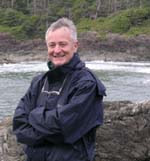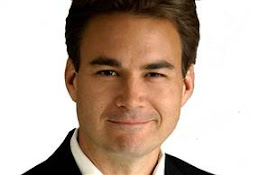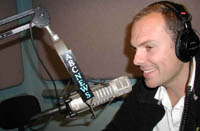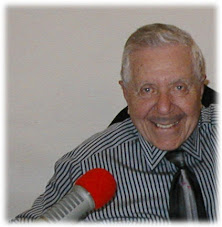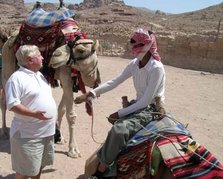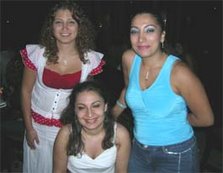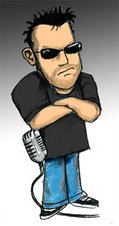
The east end of Jost Van Dyke was my home for a number of years, where I lived primarily off the sea. At that time roads or electicity even fresh water did not exist. One cooked over locally made charcole, diving or retreiving fish pots was the way of life. Much of this I learned from Charles who lived with his family on the hill behind my property, he and a few others taught me much about island living. This photo on the left is of my old friend Foxy who owns and runs Foxys Bar one of the original bar/resturants on the island. I have great memories of sitting with his kids when they were young at the back of the bar watching one of Capt. Mike Burke's Windjammer sailing ships anchor off shore...The arrival of passengers many in bright colored shirts shouldering up to the bar asking how much a drink would cost. Foxy's kids amused me by asking "why they ask the price, don't they know if they have no money Foxy give them drink for free" Foxy and I towed the old water tank that sits up behind his place (it may no longer be there these days) behind my small boat from Little Jost....Nice memories.
Here's a little history of this beautiful island. Jost Van Dyke , population 150, is named for a noted Dutch pirate. It is mountainous, has lovely beaches, tropical restaurants and watering holes at Great Harbor and White Bay.
Jost measures just four by two rugged miles, the island is rich in history. It's been home to Arawak Indians, Caribs, Dutch, Africans, and English. And John Coakley Lettsome, founder of the London Medical Society, was also born on Little Jost Van Dyke. Jost Van Dyke did not receive public electricity until December 23, 1989, and the entire island did not recieve electricity until the end of 1997. For many years the island residents used generators and many were innovators by using solar panels.
Whether you stay for a day, week, or a month, you'll find plenty to do. Trace the old trails that connect the island. Explore the overgrown ruins of sugar mills. In the fall and winter, watch whales and dolphins from a hilltop. Or visit the bubbly pool at the East End, where the foaming sea forms a natural jacuzzi. You could walk across to Little Jost or take a boat to Sandy Cay, the perfect castaway island.
It is reported that Christopher Columbus sighted the British Virgin Islands in 1493, on his second expedition to the New World; Overwhelmed by their multitude, he christened the islands 'Las Once Mil Virgines' - in honor of St. Ursula and the 11,000 maidens who sacrificed their lives in 4th century Cologne. The Crest of St. Ursula is a national symbol of the British Virgin Islands.
The islands were said to be inhabited by Caribs and Arawaks. The Dutch established the first permanent European community here in 1648. In 1666 British planters took over control of the island group from the original Dutch settlers. The islands attained the status of British Colony, and remained part of the Leeward Islands from 1872 until 1956, when the British Virgin Islands became a separately administered entity. To preserve its close economic ties with the U.S., Virgin Islands the group did not join the 1958-1962 West Indies Federation of British Islands. In 1967, the new Constitution provided for a ministerial system of government headed by a Governor. The island group remains under British Sovereignty today.
The BVI’s are constitutionally autonomous of the UK except for external affairs, defense, internal security, terms and conditions of service of public officers and the administration of the courts. These areas are the responsibilities of a UK appointed Governor. The Territory features an internal self-government that has a long history of political stability. There is an Executive Council, with the Governor as Chairman, which includes the Attorney General (ex-officio), the Chief Minister (appointed by the Governor from those elected to the Legislative Council to handle financial matters), and three other ministers appointed by the Governor on the advice of the Chief Minister.
The British Virgin Islands offer the finest sailing anywhere ... and are home to the world's largest yacht charter fleet. Balmy trade winds provide a most comfortable, tropical environment. Temperatures are rarely below 77 F in winter; or rise above 90 F in summer.





